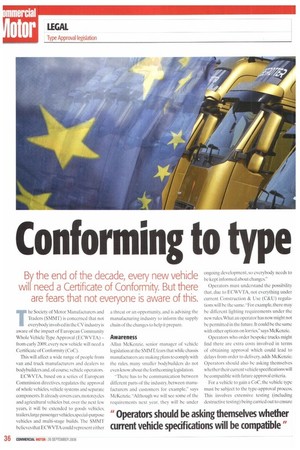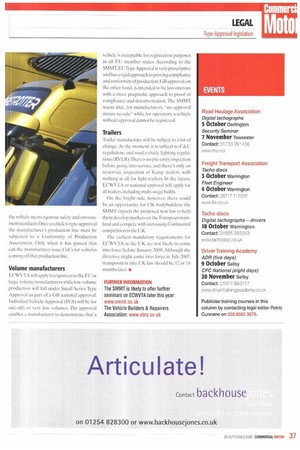Conforming to type
Page 36

Page 37

If you've noticed an error in this article please click here to report it so we can fix it.
By the end of the decade, every new vehicle
will need a Certificate of Conformity. But there are fears that not everyone is aware of this.
The Society of Motor Manufacturers and Traders (SMMT) is concerned that not everybody involved in the CV industry is aware of the impact of European Community Whole Vehicle Type Approval (ECWVTA) — from early 2009, every new vehicle will need a Certificate of Conformity (CoC).
This will affect a wide range of people from van and truck manufacturers and dealers to bodybuilders and, of course, vehicle operators.
ECWVTA, based on a series of European Commission directives, regulates the approval of whole vehicles, vehicle systems and separate components. It already covers cars, motorcycles and agricultural vehicles but, over the next few years, it will be extended to goods vehicles, trailers„large pas.sengervehicles,special-purpose vehicles and multi-stage builds. The SMMT believes that ECWVTA could represent either a threat or an opportunity, and is advising the manufacturing industry to inform the supply chain of the changes to help it prepare.
Awareness
Allan McKenzie, senior manager of vehicle legislation at the SMMT, fears that while chassis manufacturers are making plans to comply with the rules, many smaller bodybuilders do not even know about the forthcoming legislation.
"There has to be communication between different parts of the industry, between manufacturers and customers for example," says McKenzie. "Although we will see some of the requirements next year, they will be under ongoing development, so everybody needs to be kept informed about changes."
Operators must understand the possibility that, due to ECWVTA, not everything under current Construction & Use (C&U) regulations will be the same."For example, there may be different lighting requirements under the new rules.What an operator has now might not be permitted in the future. It could he the same with other options on lorries," says McKenzie, Operators who order bespoke trucks might find there are extra costs involved in terms of obtaining approval which could lead to delays from order to delivery, adds McKenzie. Operators should also be asking themselves whether their current vehicle specifications will be compatible with future approval criteria.
For a vehicle to gain a CoC, the vehicle type must be subject to the type-approval process. This involves extensive testing (including destructive testing) being carried out to ensure the vehicle meets rigorous safety and environment standards. Once a vehicle is type-approved the manufacturer's production line must be subjected to a Conformity of Production Assessment. Only when it has passed that can the manufacturer issue CoCs for vehicles corning off that production line.
Volume manufacturers ECWVTA will apply to exporters to the EU or large-volume manufacturers.while low-volume production will fall under Small Series Type Approval as part of a GB national approval. Individual Vehicle Approval (IVA) will be for one-offs or very low volumes. The approval enables a manufacturer to demonstrate that a vehicle is acceptable for registration purposes in all Eli member states. According to the SMMT, ECType Approval is very prescriptive and has a rigid approach to proving compliance and conformity of production. GB approval, on the other hand, is intended to he less onerous with a more pragmatic approach to proof of compliance and documentation. The SM MT warns that, for manufacturers, "no approval means no sale" while for operators, a vehicle without approval cannot he registered.
Trailers Trailer manufacture will he subject to a lot of change. At the moment, it is subject to C&L; regulations and road-vehicle lighting regulations (RVER).There is no pre-entry inspection before going into service, and there's only an in-service inspection of heavy trailers, with nothing at all for light trailers. In the future. ECWVIA or national approval will apply for all trailers. including multi-stage builds.
On the bright side, however, there could be an opportunity for UK bodybuilders: the SMMT expects the proposed new law to help them develop markets on the European mainland and compete with increasing Continental competition in the UK.
The earliest mandatory requirements for ECWVTA in the UK are not likely to come into force before January 2009. Although the directive might come into force in July 2007, transposition into 15K law should be 12 or 18 months later. •
































































































































































































